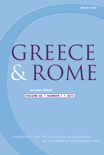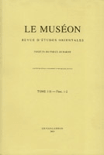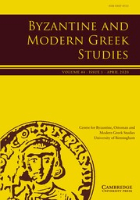
GREEK ROMAN AND BYZANTINE STUDIES
Scope & Guideline
Bridging Eras: A Journey Through Time and Thought
Introduction
Aims and Scopes
- Classical Literature and Poetics:
The journal focuses on the analysis of classical texts, exploring their literary forms, themes, and cultural significance, particularly in Greek and Roman literature. - Historical Contextualization:
Papers often contextualize literary works within their historical settings, examining political, social, and cultural dynamics that influenced the production and reception of texts. - Byzantine Studies:
There is a significant emphasis on Byzantine history and literature, addressing the complexities of this transitional period and its impact on subsequent cultures. - Interdisciplinary Methodologies:
The journal encourages interdisciplinary research, integrating perspectives from linguistics, philosophy, and art history to provide a more comprehensive understanding of ancient societies. - Textual Criticism and Manuscript Studies:
A focus on the preservation and interpretation of ancient manuscripts, including discussions on textual variants, authorship, and the transmission of texts through history.
Trending and Emerging
- Digital Humanities and Textual Analysis:
There is a growing trend towards utilizing digital tools for textual analysis, which allows for new insights into classical texts and their interpretations. - Cultural Intersections and Exchanges:
Recent publications have increasingly focused on cultural exchanges between the Greek, Roman, and Byzantine worlds, reflecting a broader interest in cross-cultural interactions and influences. - Philosophical Interpretations:
Emerging themes include deeper explorations of ancient philosophy, particularly how classical thought intersects with contemporary philosophical debates. - Gender Studies and Identity:
There is a noticeable increase in research addressing gender dynamics and identity in ancient texts, reflecting broader societal discussions about gender and representation. - Reception Studies:
An emerging focus on how classical texts have been received and interpreted throughout history, emphasizing their enduring influence on later literature and culture.
Declining or Waning
- Traditional Rhetoric:
There has been a noticeable decrease in papers focusing solely on traditional rhetorical analysis, indicating a potential shift towards more contextually rich and interdisciplinary approaches. - Mythological Studies:
Research centered on classical mythology seems to be less prevalent, possibly reflecting a broader trend towards examining historical and socio-political contexts rather than purely mythological frameworks. - Military History:
Although military history has been a significant theme, recent publications suggest a waning interest in this area, as scholars increasingly explore social, cultural, and philosophical dimensions of ancient societies.
Similar Journals

GREECE & ROME
Reviving the Voices of the Ancient WorldGREECE & ROME, published by Cambridge University Press, is a prestigious journal dedicated to the study of classical antiquity and its enduring influence on contemporary culture. This journal, indexed with ISSN 0017-3835 and E-ISSN 1477-4550, offers a platform for scholarly articles that delve into various aspects of Greek and Roman societies, literature, art, and history. With a rich history that spans from 1931 to 2024, it has consistently maintained an important position in the academic community, achieving a Q2 ranking in Classics and a Q3 ranking in Arts and Humanities as of 2023. Highlighted by a Scopus ranking of #74 out of 170 in Classics, the journal appeals to a diverse audience, including researchers, professionals, and students aspiring to deepen their understanding of the classical world. Although it does not offer open access, GREECE & ROME is committed to the dissemination of critical research and thought-provoking discourse, making significant contributions to the fields and encouraging intellectual exchange across disciplines.

Vizantiiskii Vremennik
Celebrating the Artistic and Cultural Richness of ByzantiumVizantiiskii Vremennik is a prestigious academic journal dedicated to the field of Byzantine studies, published by the esteemed ROSSIISKAYA AKAD NAUK, IZDATELSTVO NAUKA. With its ISSN 0132-3776, this journal serves as a vital platform for scholarly discourse, exploring the rich historical, cultural, and artistic legacy of the Byzantine Empire. Despite the absence of open access options, Vizantiiskii Vremennik provides valuable insights through meticulously peer-reviewed articles, making it essential reading for researchers, historians, and students engaged in classical studies and related disciplines. The journal prides itself on fostering a deeper understanding of Byzantine civilization, promoting interdisciplinary approaches, and contributing to the broader research community dedicated to this pivotal era in history. The publication's commitment to high academic standards ensures its importance in the scholarly landscape, making it a recommended source for anyone pursuing knowledge in this influential field.

Rivista di Filologia e di Istruzione Classica
Engaging Minds in the Study of Ancient Languages and LiteratureRivista di Filologia e di Istruzione Classica is a distinguished academic journal published by LOESCHER EDITORE, dedicated to advancing the fields of Classics and Linguistics. Based in Italy, this journal serves as a vital platform for original research, critical analysis, and scholarly discussions that enrich our understanding of classical texts and educational methodologies in the humanities. With its unique focus on the intricate relationship between classical literature and language, the journal aims to facilitate discourse among researchers, educators, and students alike. Although categorized in the fourth quartile in both Classics and Linguistics, it provides an essential venue for scholars seeking to disseminate their findings and engage with contemporary academic debates. The journal is indexed in various databases, though recent coverage in Scopus has been discontinued. Researchers interested in exploring the complex layers of classical philology and instructional practices are encouraged to contribute to and engage with the innovative scholarship presented in this journal.

Eirene-Studia Graeca et Latina
Advancing the Dialogue of Ancient WisdomEirene-Studia Graeca et Latina, ISSN 0046-1628, is a prominent academic journal published by the Institute of Classical Studies, Academy of Sciences of the Czech Republic. Focusing on the fields of Classics, Linguistics, and Archaeology, this journal serves as a vital platform for scholarly discourse and research dissemination since its inception in 2002. Although it operates under a traditional access model, the journal has established itself within the academic community, evidenced by its placement in the Q4 category across multiple disciplines in 2023. This includes significant rankings in areas such as Archaeology and Language and Linguistics, where it finds itself within the 27th to 16th percentiles of its respective categories. Eirene aims to foster the advancement of research in the Humanities, providing a rigorous forum for scholars and practitioners interested in classical studies. Its contribution to the academic landscape is essential for those who aspire to explore the depths of ancient languages, cultures, and methodologies, making it a valuable resource for researchers, professionals, and students alike.

Museon
Advancing Scholarship Across Humanities DisciplinesMuseon, published by PEETERS in Belgium, is a prominent academic journal dedicated to exploring the interconnected realms of History, Linguistics, Literature, and Religious Studies. With an ISSN of 0771-6494 and an E-ISSN of 1783-158X, this journal has been a reliable source of scholarly discourse since its inception in 1972, with coverage extending from 1976 to 2023. While the journal does not offer open access, it maintains a respectable reputation, as evidenced by its category quartile rankings in 2023, positioning it in Q2 for Literature and Literary Theory and Q3 for the other disciplines. Researchers and students in these fields will find Museon to be an essential platform for disseminating and engaging with innovative and critical analyses. The journal's commitment to high-quality scholarship is reflected in its diverse scope and its ongoing contribution to the humanities, making it a vital resource for advancing knowledge and fostering academic dialogue.

Konstantinove Listy-Constantines Letters
Advancing interdisciplinary dialogue in history, philosophy, and religion.Konstantinove Listy - Constantines Letters is a premier academic journal published by the Constantine Philosopher University in Nitra, Slovakia. With a focus on the interdisciplinary exploration of historical, philosophical, and religious studies, this journal has established itself as a significant platform for scholarly discourse since its inception in 2015. The journal's impressive rankings—Q1 in History and Religious Studies, along with Q2 in Philosophy—demonstrate its commitment to high-quality research, concurrent with its strong performance in Scopus rankings, placing it in the 80th percentile for both Religious Studies and History disciplines. As an integral part of the academic landscape, Konstantinove Listy invites researchers, professionals, and students alike to contribute to its mission of advancing knowledge and understanding in these vital fields. While the journal operates under traditional publishing, it is recognized for its accessibility and contribution to fostering a vibrant scholarly community.

Jahrbuch der Oesterreichischen Byzantinistik
Advancing Byzantine scholarship with every issue.Jahrbuch der Oesterreichischen Byzantinistik, published by the esteemed Österreichische Akademie der Wissenschaften, is a vital academic journal dedicated to advancing the study of Byzantine studies, history, and related fields. Situated in Austria, this journal serves as a critical platform for scholars and researchers, offering a rich collection of articles that reflect the diverse aspects of Byzantine culture, literature, and archaeological findings. Despite its recent categorization in the Q4 quartile in areas such as Archaeology, History, and Literary Theory, it commands impressive rankings within Scopus, particularly in Literature and Literary Theory at the 87th percentile, highlighting its growing impact in the arts and humanities. Researchers and professionals can access comprehensive studies that span from 2010 to 2018 and continue from 2020 to 2023, paving the way for interdisciplinary dialogue and exploration within the Byzantine field. As a continually evolving resource, the Jahrbuch is essential for those committed to deepening their understanding of this historically rich domain.

Minerva-Revista de Filologia Clasica
Connecting scholars in the pursuit of knowledge.Minerva-Revista de Filologia Clasica, an esteemed academic journal published by the Universidad de Valladolid, is a pivotal resource in the fields of Classics, Linguistics, and Literature. With its ISSN 0213-9634 and E-ISSN 2530-6480, this journal has been championing open access since 2017, making high-quality research accessible to a global audience. Based in Valladolid, Spain, Minerva is dedicated to the exploration and dissemination of scholarly work related to classical philology, offering a platform for the exchange of ideas among researchers, educators, and students alike. Recognized in the 2023 category quartiles as Q3 in Classics and Q4 in Linguistics and Language, this journal provides valuable insights and contributes significantly to its fields, allowing authors and readers to engage with important discussions and innovative perspectives. As the academic landscape evolves, Minerva continues to adapt, fostering a vibrant community committed to the advancement of knowledge in antiquity and its linguistic dimensions.

BYZANTINE AND MODERN GREEK STUDIES
Cultivating Insight into Greece's Cultural NarrativeBYZANTINE AND MODERN GREEK STUDIES, published by Cambridge University Press, is a premier journal dedicated to the exploration of Byzantine and modern Greek history, literature, culture, and linguistics. With an ISSN of 0307-0131 and an E-ISSN of 1749-625X, the journal has established itself as a significant contribution to the field since its inception in 1975, with converged publication years extending to 2024. It currently holds a commendable ranking in various categories, including Q2 in Cultural Studies and History, as well as Q1 in Literature and Literary Theory, reflecting its academic rigor and impact. Researchers and scholars can access a wealth of knowledge that highlights the intricate connections between Byzantine heritage and modern Greek identity, all while benefiting from the journal's high visibility in indexes such as Scopus, which ranks it favorably within the top percentiles of related fields. The journal's commitment to fostering interdisciplinary dialogue makes it an invaluable resource for those seeking to deepen their understanding and appreciation of Greece's historical and cultural narrative.

GYMNASIUM
Exploring the Nexus of Classics and EducationGYMNASIUM, published by Universitätsverlag C Winter Heidelberg GmbH, is an academic journal dedicated to the fields of Classics and Education. Since its inception in 1970, the journal has served as a platform for scholarly discourse, focusing on the intersection of classical studies and educational methodologies. Despite its discontinuation from Scopus coverage post-2021, GYMNASIUM remains an important resource for researchers, professionals, and students, fostering a deeper understanding of ancient texts and their relevance in contemporary educational frameworks. Current rankings place the journal in the Q4 quartile in both Classics and Education categories, reflecting its niche yet significant contribution to these fields. Researchers can access the journal's past issues through various academic libraries in Germany, enhancing interdisciplinary study and promoting scholarship across broader educational horizons.